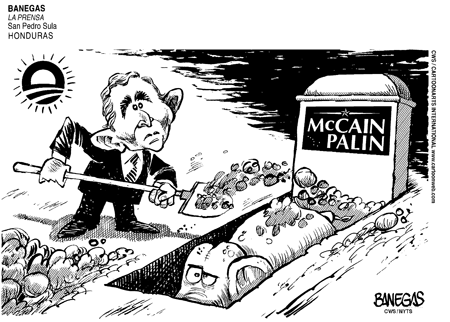Monday, November 24, 2008
AP: Bombs kill at least 20 in Iraq ahead of pact vote
Iraqi civilians inspect the wreckage of a bus bombing in Baghdad, Iraq, Monday, Nov. 24, 2008. A female suicide bomber blew herself up near an entrance to the U.S.-protected Green Zone and a bomb tore through a bus carrying Iraqi government employees in separate attacks on Monday, killing at least 18 people, Iraqi officials said.
(AP Photo/Hadi Mizban)Bombs kill at least 20 in Iraq ahead of pact vote
BAGHDAD – A woman hiding a bomb under her long robe blew herself up Monday among Iraqis waiting to enter the U.S.-protected Green Zone, where lawmakers plan to vote this week on a pact that would let American forces stay in Iraq for up to three more years.
The morning attack in central Baghdad killed seven people, by an Iraqi count, and came about 45 minutes after a bomb destroyed a minibus carrying Trade Ministry employees in the eastern part of the capital. At least 13 people died in that blast, most of them women; some of the bodies were burned so badly that authorities could not immediately identify them.
Ahmed al-Sayyid, 23, said he was waiting in line with friends at an entrance to the Green Zone, hoping for a job interview with the Iraqi police. A woman in a black abaya, an enveloping cloak, approached the line without drawing the attention of guards, he said.
"Suddenly, she blew herself up about 50 meters from where I was standing. I was horrified and I ran away. But seconds later, I returned to the explosion site, which was filled with smoke, and I could see some wounded people and pieces of flesh," al-Sayyid said.
Guards fired in the air to disperse the crowd after the explosion, he said.
U.S. troops have been instrumental in weakening insurgents, and the latest attacks appeared to bolster the Iraqi government's claim that a hasty American departure could undermine the relative stability that many parts of Iraq have enjoyed since 2007. That argument is key to efforts by Prime Minister Nouri al-Maliki to win parliament's broad approval for the U.S.-Iraqi pact.
The ruling coalition has a majority in parliament and could secure at least a thin majority if the 275-seat legislature votes as scheduled Wednesday on the security deal. Al-Maliki's campaign, however, has run into resistance from lawmakers who either want the Americans to leave immediately or seek to extract political concessions in return for supporting the government.
Wednesday's session in parliament will be the last before the legislature goes into recess for the Muslim feast of Eid al-Adha, when scores of lawmakers travel to Saudi Arabia for the annual Muslim pilgrimage to Mecca, said Khalid al-Attiyah, deputy speaker of the parliament.
Lawmakers will meet again in the second half of December, he said.
American troops currently operate under the legal cover of a U.N. mandate that expires Dec. 31. If the Iraqi parliament rejects the agreement and the U.N. mandate is not renewed, U.S. and other foreign forces in Iraq would have to be confined inside their bases from the beginning of 2009.
There was no evidence that the attacks on Monday were linked to the contentious debate over the security pact, which sets a timeline for the withdrawal of U.S. troops — from cities by next June 30 and the entire country by Jan. 1, 2012 — and places them under strict Iraqi supervision.
But the bombings amounted to a show of defiance and a reminder of the possibility that attacks could increase as American troop levels fall and the Iraqis assume more responsibility. President-elect Barack Obama has said he wants to withdraw combat troops from Iraq within 16 months of taking office in January, an even speedier timetable than the one outlined in the security pact.
Under the deal, Iraq would have full responsibility for the Green Zone but is entitled to request "limited and temporary support" from the U.S. military in maintaining security. The heavily protected area on the west bank of the Tigris river houses the U.S. Embassy and the Iraqi government headquarters.
In a news conference last week, al-Maliki said he might relax restrictions on entry into the Green Zone "so the whole of Baghdad can, God willing, be green too."
Monday's suicide bombing at a checkpoint just outside the zone suggested the prime minister's declaration will remain wishful thinking for a while. Seven people died and 13 were wounded in the attack, according to an Interior Ministry official who declined to give his name.
The U.S. military said the bombing killed two Iraqi army members and three civilians. One civilian was injured, it said.
Iraq's intelligence service said the bomber had targeted the checkpoint used by its workers to enter the Green Zone to reach the agency's headquarters, which is inside. The service said female employees, including a pregnant woman, were killed and some of its guards were wounded.
Suicide bombings are associated with the Sunni-led insurgency. Al-Qaida in Iraq has been increasingly using women as suicide attackers because their billowing robes easily conceal explosives. Iraqi police often lack enough policewomen to search women carefully.
The U.S. military said 14 people were killed and four were wounded in the rush-hour bombing of the minibus carrying Trade Ministry workers. An official with the state-owned Iraqi shopping centers company, which is part of the ministry, said 13 ministry employees were killed and three were wounded. The official spoke on condition of anonymity.
Police said a bomb had been attached to the bus, which blew up in a Shiite area.
In another attack, a roadside bomb targeted a police patrol near Technology University in eastern Baghdad, killing two civilians, an Iraqi police officer and an official at Ibn al-Nafis hospital said on condition of anonymity. Two police officers were among four wounded people.
___
Associated Press Writers Sameer N. Yacoub and Qassim Abdul-Zahra contributed to this report.

